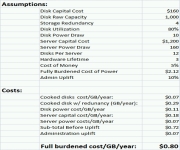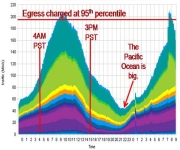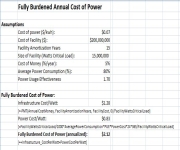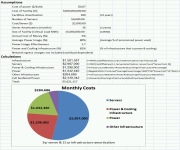Author Archive

I wrote this blog entry a few weeks ago before my recent job change. It’s a look at the cost of high-scale storage and how it has fallen over the last two years based upon the annual fully burdened cost of power in a data center and industry disk costs trends. The observations made in…

Resource Consumption Shaping is an idea that Dave Treadwell and I came up with last year. The core observation is that service resource consumption is cyclical. We typically pay for near peak consumption and yet frequently are consuming far below this peak. For example, network egress is typically charged at the 95th percentile of peak…
I’ve resigned from Microsoft and will join the Amazon Web Services team at the start of next year. As an AWS user, I’ve written thousands of lines of app code against S3, and now I’ll have an opportunity to help improve and expand the AWS suite. In this case, I’m probably guilty of what many…

In the Cost of Power in Large-Scale Data Centers, we looked at where the money goes in a large scale data center. Here I’m taking similar assumptions and computing the Annual Cost of Power including all the infrastructure as well as the utility charge. I define the fully burdened cost of power to be the…
Michael Manos yesterday published Our Vision for Generation 4 Modular Data Centers – One Way of Getting it Just Right. In this posting, Mike goes through the next generation modular data center designs for Microsoft. Things are moving quickly. I first argued for modular designs in a Conference on Innovative Data Systems paper submitted in…
Ed Lazowska of University of Washington invited me in speak to his CSE 490H class. This is a great class that teaches distributed systems in general and the programming assignments are MapReduce workloads using Hadoop. I covered two major topics, the first on high scale service best practices. How to design, develop, and efficiently operate…
Yesterday, AWS announced new pricing for SimpleDB and its noteworthy: free developer usage for 6 months. No charge for up to 1GB of ingres+egress, 25 machine hours, and 1GB storage. To help you get started with Amazon SimpleDB, we are providing a free usage tier for at least the next six months. Each month, there…
In a comment to the last blog entry, Cost of Power in Large-Scale Data Centers Doug Hellmann brought up a super interesting point It looks like you’ve swapped the “years” values from the Facilities Amortization and Server Amortization lines. The Facilities Amortization line should say 15 years, and Server 3. The month values are correct,…

I’m not sure how many times I’ve read or been told that power is the number one cost in a modern mega-data center, but it has been a frequent refrain. And, like many stories that get told and retold, there is an element of truth to the it. Power is absolutely the fastest growing operational…
Large sorts need to be done daily and doing it well actually is economically relevant. Last July, Owen O’Malley of the Yahoo Grid team announced they had achieved a 209 second TeraSort run: Apache Hadoop Wins Terabyte Sort Benchmark. My summary of the Yahoo result with cluster configuration: Hadoop Wins TeraSort. Google just announced a…
Two weeks ago I posted the notes I took from Tony Hoare’s “The Science of Programming” talk at the Computing in the 21st Century Conference in Beijing. Here’s are the slides from the original talk: Tony Hoare Science of Programming (199 KB). Here are my notes from two weeks back: Tony Hoare on The Science…
Last week, IBM honored database giant Pat Selinger by creating a Ph.D. Fellowship in her name. I worked with Pat closely for many years at IBM and much of what I learned about database management systems was from Pat during those years. She was a one of the original members of the IBM System R…
Intel Fellow and Director of Storage Architecture Knut Grimsrud presented at WinHEC 2008 last week and it caught my interest for several reasons: 1) he talked about Intel findings with their new SSD which looks like an extremely interesting price/performer, 2) they have found interesting power savings in their SSD experiments beyond the easy to…
Abolade Gbadegesin, Windows Live Mesh Architect gave a great talk at the Microsoft Professional Developers Conference on Windows Live Mesh (talk video, talk slides). Live mesh is a service that supports p2p file sharing amongst your devices, file storage in the cloud, remote access to all your devices (through firewalls and NATS), and web access…
Butler Lampson, one of the founding members of Xerox PARC, Turing award winner, and one of the most practical engineering thinkers I know spoke a couple of days ago at the Computing in the 21st Century Conference in Beijing. My rough notes from Butler’s talk follow. Overall Butler argues that “embodiment” is the next big…
Tony Hoare spoke yesterday at the Computing in the 21st Century Conference in Beijing. Tony is a Turing award winner, Quicksort inventor, author of the influential Communication Sequential Processes (CSP) formal language, and long time advocate of program verification and tools to help produce reliable software systems. In his talk he argues that programming should…

I wrote this blog entry a few weeks ago before my recent job change. It’s a look at the cost of high-scale storage and how it has fallen over the last two years based upon the annual fully burdened cost of power in a data center and industry disk costs trends. The observations made in…

Resource Consumption Shaping is an idea that Dave Treadwell and I came up with last year. The core observation is that service resource consumption is cyclical. We typically pay for near peak consumption and yet frequently are consuming far below this peak. For example, network egress is typically charged at the 95th percentile of peak…
I’ve resigned from Microsoft and will join the Amazon Web Services team at the start of next year. As an AWS user, I’ve written thousands of lines of app code against S3, and now I’ll have an opportunity to help improve and expand the AWS suite. In this case, I’m probably guilty of what many…

In the Cost of Power in Large-Scale Data Centers, we looked at where the money goes in a large scale data center. Here I’m taking similar assumptions and computing the Annual Cost of Power including all the infrastructure as well as the utility charge. I define the fully burdened cost of power to be the…
Michael Manos yesterday published Our Vision for Generation 4 Modular Data Centers – One Way of Getting it Just Right. In this posting, Mike goes through the next generation modular data center designs for Microsoft. Things are moving quickly. I first argued for modular designs in a Conference on Innovative Data Systems paper submitted in…
Ed Lazowska of University of Washington invited me in speak to his CSE 490H class. This is a great class that teaches distributed systems in general and the programming assignments are MapReduce workloads using Hadoop. I covered two major topics, the first on high scale service best practices. How to design, develop, and efficiently operate…
Yesterday, AWS announced new pricing for SimpleDB and its noteworthy: free developer usage for 6 months. No charge for up to 1GB of ingres+egress, 25 machine hours, and 1GB storage. To help you get started with Amazon SimpleDB, we are providing a free usage tier for at least the next six months. Each month, there…
In a comment to the last blog entry, Cost of Power in Large-Scale Data Centers Doug Hellmann brought up a super interesting point It looks like you’ve swapped the “years” values from the Facilities Amortization and Server Amortization lines. The Facilities Amortization line should say 15 years, and Server 3. The month values are correct,…

I’m not sure how many times I’ve read or been told that power is the number one cost in a modern mega-data center, but it has been a frequent refrain. And, like many stories that get told and retold, there is an element of truth to the it. Power is absolutely the fastest growing operational…
Large sorts need to be done daily and doing it well actually is economically relevant. Last July, Owen O’Malley of the Yahoo Grid team announced they had achieved a 209 second TeraSort run: Apache Hadoop Wins Terabyte Sort Benchmark. My summary of the Yahoo result with cluster configuration: Hadoop Wins TeraSort. Google just announced a…
Two weeks ago I posted the notes I took from Tony Hoare’s “The Science of Programming” talk at the Computing in the 21st Century Conference in Beijing. Here’s are the slides from the original talk: Tony Hoare Science of Programming (199 KB). Here are my notes from two weeks back: Tony Hoare on The Science…
Last week, IBM honored database giant Pat Selinger by creating a Ph.D. Fellowship in her name. I worked with Pat closely for many years at IBM and much of what I learned about database management systems was from Pat during those years. She was a one of the original members of the IBM System R…
Intel Fellow and Director of Storage Architecture Knut Grimsrud presented at WinHEC 2008 last week and it caught my interest for several reasons: 1) he talked about Intel findings with their new SSD which looks like an extremely interesting price/performer, 2) they have found interesting power savings in their SSD experiments beyond the easy to…
Abolade Gbadegesin, Windows Live Mesh Architect gave a great talk at the Microsoft Professional Developers Conference on Windows Live Mesh (talk video, talk slides). Live mesh is a service that supports p2p file sharing amongst your devices, file storage in the cloud, remote access to all your devices (through firewalls and NATS), and web access…
Butler Lampson, one of the founding members of Xerox PARC, Turing award winner, and one of the most practical engineering thinkers I know spoke a couple of days ago at the Computing in the 21st Century Conference in Beijing. My rough notes from Butler’s talk follow. Overall Butler argues that “embodiment” is the next big…
Tony Hoare spoke yesterday at the Computing in the 21st Century Conference in Beijing. Tony is a Turing award winner, Quicksort inventor, author of the influential Communication Sequential Processes (CSP) formal language, and long time advocate of program verification and tools to help produce reliable software systems. In his talk he argues that programming should…